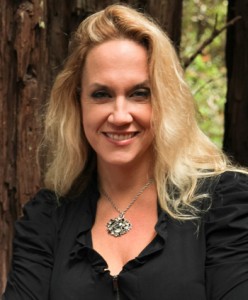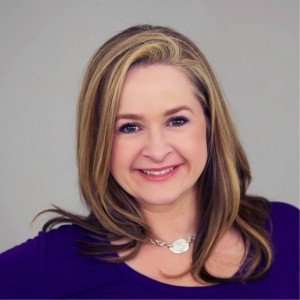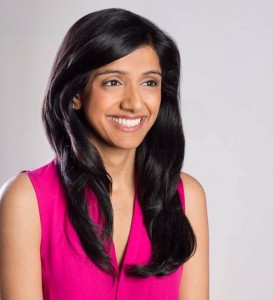Trailblazers, All Three: Romero, Murray, Shah
On the topics of perspectives, storytelling, and the future of medicine
Three women. Three speakers. Three different ways of weaving the theme of Radical Collaboration at this year’s TEDxSantaCruz event, which takes place Friday.
These three — Brenda Romero, Sarah-Jane Murray, and Bansi Shah — will round out the two-dozen presenters on the stage at the Rio Theatre from 9 a.m. to 4:30 p.m. April 24. Romero will talk about perspectives and the cost of being “other.” Murray will talk about storytelling. Shah will talk about the future of medicine.
 • Brenda Romero started working in the video game industry when she was 15, and after more than three decades in the industry, she has credits on 22 game titles. She’s known for her work on the role-playing series, Wizardry, as well as Def Jam: Icon, Playboy: The Mansion, and Dungeons & Dragons: Heroes.
• Brenda Romero started working in the video game industry when she was 15, and after more than three decades in the industry, she has credits on 22 game titles. She’s known for her work on the role-playing series, Wizardry, as well as Def Jam: Icon, Playboy: The Mansion, and Dungeons & Dragons: Heroes.
For Romero, games are fun, but they’re also life-changing. Inspired by her 7-year-old daughter, she began work on a non-digital series of games, The Mechanic Is the Message, dedicated to expressing difficult subjects — like the teaching of American slavery — through interactive media. Her game, Train, derived from the events of the Holocaust, won the Vanguard Award at Indiecade in 2009.
“We change as people through games,” she said in her 2011 TEDxPhoenix talk, “because we’re involved, and we’re playing, and we’re learning as we do so.”
Two years ago, Romero became the first game designer-in-residence at UC Santa Cruz’s Center for Games and Playable Media, and now she also leads the new master’s degree program in games and playable media at UCSC’s Silicon Valley Center.
She’s won numerous awards, including the 2013 Women in Games Lifetime Achievement Award from Microsoft and a 2014 Fulbright Fellowship to work with Ireland’s game industry. The co-founder of social game developer Loot Drop Inc., she’s the author of three books, Breaking Into the Game Industry: Advice for a Successful Career from Those Who Have Done It, Challenges for Game Designers and Sex in Video Games. She gave a 2011 talk at TEDxPhoenix.
 • SJ Murray, who has also given a TEDx talk, in Austin, Texas, calls storytelling one of the most powerful tools humans possess to understand our place in the world.
• SJ Murray, who has also given a TEDx talk, in Austin, Texas, calls storytelling one of the most powerful tools humans possess to understand our place in the world.
“We’re saturated by an overload of information every day,” she says. “Stories cut through the noise and empower us to connect and share our vulnerabilities. But are we always conscious of the narratives that surround us and the ways these narratives influence us? How might we harness the power of story to do good? Why should we all understand how powerful stories are in shaping our behaviors and ways of relating to one another? These are the kinds of questions that fascinate me.”
The Ireland-born Murray got her early education in France and her PhD from Princeton. Aside from storytelling, she’s an Emmy-nominated screenwriter/producer and an associate professor at Baylor University. She founded StoryRhetoric, committed to telling insanely great stories and helping others do the same.
The title of her TEDxSantaCruz talk is “Wired for Story.”
“At its core, it gets at the ethics of storytelling,” she says. “How do the types of stories we tell shape and influence culture? Why are stories so sticky, and how do they influence our brain patterns and experiences? Do the stories we tell dictate who we become, and if so why?”
 • Bansi Shah will share with us the history, research, and learnings of collaborative health care. A data scientist, chief technical officer, and cofounder of HealthCrew, a company building chronic disease management software, she is passionate about changing health care.
• Bansi Shah will share with us the history, research, and learnings of collaborative health care. A data scientist, chief technical officer, and cofounder of HealthCrew, a company building chronic disease management software, she is passionate about changing health care.
As she puts it, there are groups of people around the world that outperform on every health measure. Their secret? It’s not genetics and it’s not entirely diet. It’s something much simpler, something that’s scalable, free, and missing from the American health care system — the power of social ties.
In the novel health care delivery model she promotes, a single physician sees multiple patients at the same time. The patients get more time with their doctors. They support and educate each other. And the doctors leverage the power of groups to motivate peer patients to achieve better outcomes.
“Group medical care has a massive historical, cultural, and academic precedent,” says Shah. “Centuries ago, tribal medicine was practiced at a community level by caregivers who provided personalized treatment and followups. Today, some of the world’s healthiest communities, such as Okinawa in Japan and Sardinia in Italy, attribute their outcomes to high levels of social engagement.”
She received a master’s in statistics and a bachelor’s in mathematical and computational science from Stanford University. She holds a patent in Digital Data Processing Systems and Methods for Searching and Communicating Via a Social Network. She was the keynote speaker at the Association for Advancement of Artificial Intelligence’s 2014 Spring Symposia.
